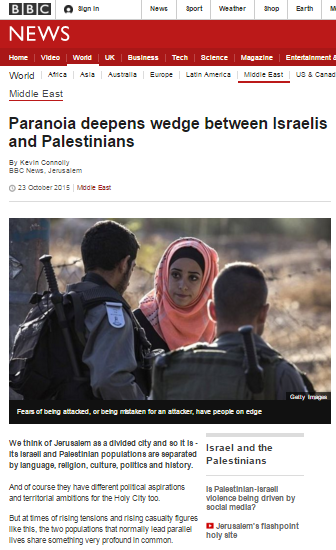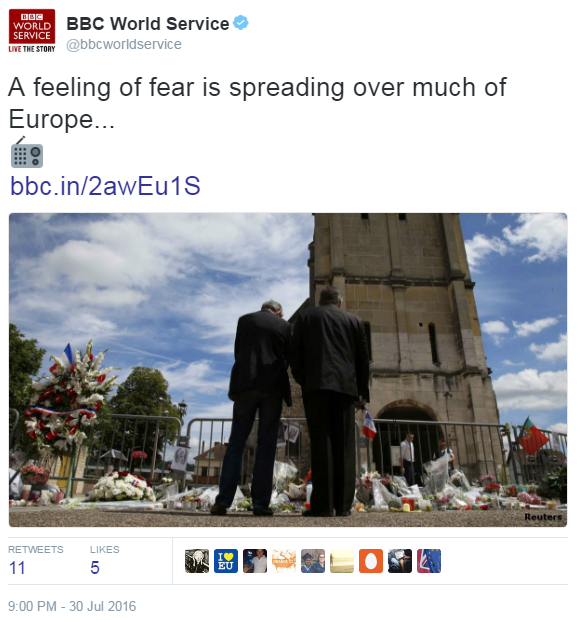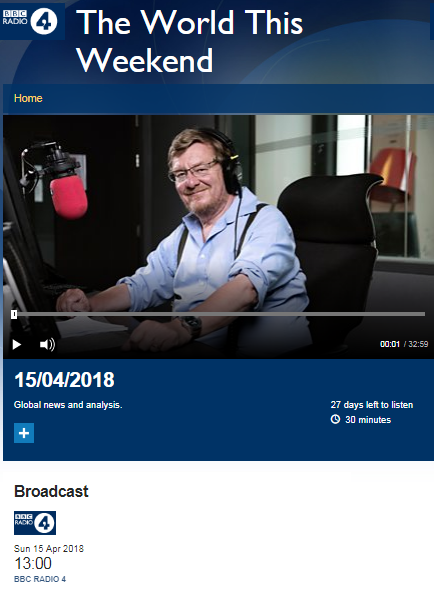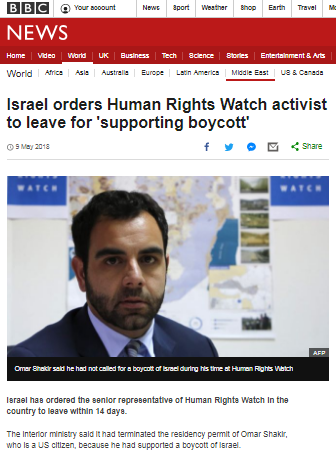Last October we discussed an article by Kevin Connolly – then of the BBC’s Jerusalem bureau – which has since been promoted as ‘related reading’ many times on the BBC News website.
“During the first three weeks of October 2015, ten Israelis were killed and 112 wounded – eleven of them seriously – in forty stabbing attacks, four shootings and five vehicular attacks which took place throughout the country.
On October 23rd, however, BBC News told its audiences that Israelis are suffering from either a collective psychosis ‘characterised by delusions of persecution’ or ‘unjustified suspicion and mistrust of other people’ – depending on which definition of the word paranoia BBC editors intended their headline to communicate.
Either way, it is obviously extremely hard to believe that if British citizens had been subjected to such a wave of terror attacks, the BBC would characterise their mood as unjustified or disconnected from reality by using the term ‘paranoia’. And it is of course equally unlikely that after over fifty attacks on British citizens in three weeks, the BBC would still be avoiding the use of the word ‘terror’ – as it continues to do in its current coverage of Israel.”
Happily, such a scenario has not transpired in Britain but at the end of July, the BBC World Service turned its attentions to “the fear that lies over Europe” in an edition of ‘The World This Week’.

Presenter Jonny Dymond described the item at the beginning of the programme:
“As one brutal attack has followed another in France and Germany, I’ll take the mood of the continent with one of our most experienced Europe watchers – the editor of our Europe bureau.”
His introduction (from 00:47 here) was as follows:
“Europe has not known a week or two like the last ones for many, many years. First the terrible slaughter in Nice that left at least 84 dead, then a string of attacks in southern Germany. Then this week the killing of a French priest in a quiet town as he and his parishioners celebrated morning mass on a summer’s day.
An anguished debate over how to deal with violent Islam, both imported and homegrown, is in full swing. A new national guard will be created to defend citizens against terror attacks. Not for the first time, a beleaguered President Francois Hollande spoke darkly of war.” […]
In Germany shootings, stabbings and bombings – some connected with so-called Islamic State; all connected in some way with Germany’s embrace of migrants – have rocked a country that has over the decades become a by-word for cautious, conservative stability.”
Introducing the editor of the BBC’s Europe bureau, Simon Wilson, Dymond spoke of Europeans “confronted with a darker version of their continent; one gloomy about the future and nervous about what some perceive as the enemy within.”
Wilson told audiences:
“I was in Nice within a few hours of the attack there. People were really scared. That’s a really scary thought if anyone can take control of a vehicle and drive it into you. Those feelings will fade in weeks and months and other cities have overcome terror attacks and got back to normal. I think people are changing their plans. Do you want to be in a big crowd watching a football match on a big screen in Brussels or Paris at the moment? Probably not. ‘Climate of fear’ probably a bit too strong but I think in little ways individuals all over Europe are shaping up to a new reality and the one consistent thing you do hear people saying is ‘this isn’t going to go away soon, is it? This is the new normal and we’re going to have to live with it’.”
So as we see, in contrast to its portrayal of Israeli fears of what it refuses to term terrorism as ‘paranoia’, the BBC is perfectly able to identify – and empathise with – the understandable fears of Europeans following what it has no problem defining as “terror attacks”. And remarkably, it also has no qualms about identifying the cause: “violent Islam”.
The item went on to include reference to an issue rarely if ever acknowledged in BBC coverage of Israel: the obligation of a state to defend its citizens.
JD: “How have the attacks changed the position of the leaders of the two great EU countries France and Germany?”
SW: “For Francois Hollande this is devastating politically. He was already pretty weak […] the elections are up next year. The primary function of a state is to protect its citizens and plainly over a period of 18 months they’ve found that very, very difficult to do. So clearly for Francois Hollande and the French socialists, there’s a huge challenge and I think they’re in big trouble politically.”
Wilson later added that the German chancellor “also faces elections next year and it wouldn’t take much more I think for her to be in big trouble.”
Asked by Dymond if the terror attacks “lead to a more introspective Europe”, Wilson remarked that “Europe’s leaders are consumed with the internal problems […] they are absolutely absorbed with these crises” and noted that European Council president Donald Tusk “has said publicly he thinks Western civilisation is being threatened by everything that’s going on”.
As readers no doubt recall the BBC long since made it clear that it believes that terror attacks against Israelis are “very different” from – and not comparable to – those perpetrated against citizens of other nations. Apparently it is also of the opinion that the concerns of Israeli civilians can be portrayed differently from those of citizens of EU countries. While the BBC refuses to acknowledge that the double standard it promotes is a “significant issue of general importance”, we remain convinced that it compromises the BBC’s claim to impartial reporting.
Related Articles:
BBC Complaints: terror attacks in Jerusalem and Tunisia are “very different”
BBC News finds terror (without quotation marks) in Europe
Reviewing BBC reporting of vehicular attacks in France and Israel




